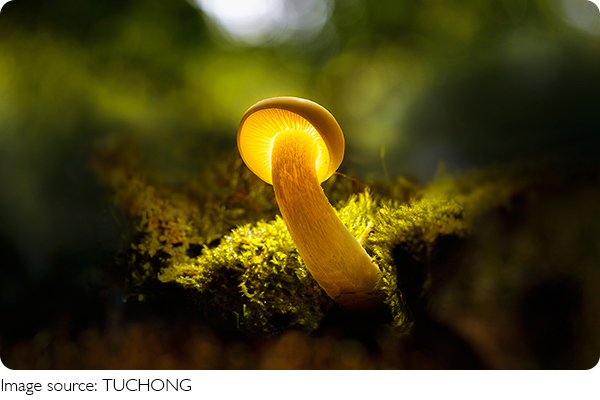Mushrooms in Forest

In the hidden corners of the forest, there's a humble yet powerful organism playing the role of "nature's recycler" – mushrooms. These often overlooked fungi are, in fact, an essential part of our ecosystem.
Surprisingly, they play a crucial role in the natural cycle of life. So, why are mushrooms called "nature's recyclers"? Let's explore their fascinating contribution.
The Role of Mushrooms as Decomposers
First and foremost, mushrooms are the decomposers of the natural world. In the forest ecosystem, material cycling is an ongoing process. When organisms die, their organic matter needs to be broken down and returned to the soil for other life forms to utilize. This is where mushrooms come in as key players. They efficiently break down dead plants and animals, turning complex organic material into simple compounds like carbon dioxide, water, and inorganic salts. These compounds can then be absorbed by plants, contributing to the cycle of nutrients in the ecosystem.
What's remarkable is mushrooms' ability to decompose tough materials like cellulose and lignin, which are components of wood, leaves, and other plant remnants. These substances are hard for many organisms to digest. By secreting enzymes, mushrooms break these complex organic compounds down into nutrients that other organisms can use. This decomposing action is vital for maintaining the fertility and productivity of forest soils.
Mutualistic Relationships with Plants
Mushrooms also form mutualistic relationships with many plants, a partnership known as mycorrhizal symbiosis. In this relationship, the mycelium of the mushroom connects with the plant's roots, helping the plant absorb water and minerals, especially phosphorus. In return, the plant supplies the mushrooms with carbohydrates. This mutually beneficial arrangement not only promotes plant growth but also enhances the overall health and diversity of the forest ecosystem.
Improving Soil Structure
Beyond their role as decomposers, mushrooms have a significant impact on soil structure and stability. The mycelium network they create in the soil helps to bind soil particles together, improving soil structure. This leads to better soil permeability and water retention. A well-structured soil supports healthy root growth, optimizes water retention, and ensures the ecological health of the forest. This shows that mushrooms not only function as decomposers but also contribute tangibly to the quality of the environment.
Maintaining Ecological Balance
Mushrooms play many other roles in the forest ecosystem. They are a food source for a variety of animals, including insects, small mammals, and birds. These animals consume mushrooms for nourishment, and in the process, they help spread the spores of the mushrooms, aiding in reproduction. This natural interaction helps maintain biodiversity and ecological balance within the forest.
Moreover, some mushrooms also excel in purifying the environment. They can absorb and accumulate heavy metals and other pollutants from the soil, reducing the impact of these harmful substances on the environment and organisms. This purifying action is crucial, particularly in protecting the forest ecosystem from industrial pollution and human interference.
Challenges Mushrooms Face
However, mushrooms are not immune to challenges. Deforestation, pollution, and climate change pose significant threats to their survival and distribution. Thus, protecting forests and maintaining healthy ecosystems is crucial for preserving mushrooms and the vital ecological services they provide.
Conclusion and Future Outlook
Overall, mushrooms truly deserve the title of "nature's recyclers." They serve multiple roles in the forest ecosystem: decomposers, nutrient cyclers, environmental purifiers, and even contributors to soil health. Through their breakdown of organic materials, formation of symbiotic relationships, improvement of soil structure, and support of biodiversity, mushrooms maintain the health and ecological diversity of forests. Their activities are essential for sustaining life on Earth.

As our awareness of environmental issues grows, we should place more emphasis on protecting natural ecosystems. This includes the sustainable management of forests and furthering scientific research to explore the potential applications of mushrooms in ecology, agriculture, and environmental conservation. Let's work together to protect this natural treasure and become true stewards of ecological civilization.
-
 Peony SymbolismPeonies: The Blossoming Flower of Wealth and Prosperity—Here’s Why They Are So Special!
Peony SymbolismPeonies: The Blossoming Flower of Wealth and Prosperity—Here’s Why They Are So Special! -
 Bamboo Growth MiracleDid You Know Bamboo Can Grow Over 1 Meter a Day? Nature’s Speed Champion Will Leave You Stunned!
Bamboo Growth MiracleDid You Know Bamboo Can Grow Over 1 Meter a Day? Nature’s Speed Champion Will Leave You Stunned! -
 Corn's Growth MiracleHow Corn Thrives Everywhere—Discover the Amazing Secrets Behind Its Incredible Growth Potential!
Corn's Growth MiracleHow Corn Thrives Everywhere—Discover the Amazing Secrets Behind Its Incredible Growth Potential!